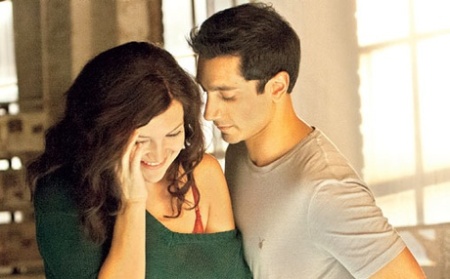‘My voice sounds all tinny and fake. Like I don’t come from anywhere.’
And with those words, The Reluctant Fundamentalist stole my heart. Stole my heart so thoroughly that I didn’t mind seeing it twice in the space of two days.
I will be honest. I haven’t read the book and hence, cannot compare it to its cinematic adaptation. What I can do is give you my take on the movie and you can decide whether or not it is worth the same investment I made (twice).
The Reluctant Fundamentalist (based on the novel of the same name by Mohsin Hamid) is a Mira Nair film. That means it has lots of beautiful, sweeping shots of cities around the world and a pensive young man looking plaintively (and quite stunningly) for his roots. As you might have guessed by now, I am comparing TRF to The Namesake for both are, at their core, different versions of the same story. One, of course, is more politically charged than the other but when you look at their cores, they’re both about young men adrift in an adopted world that has suddenly and inexplicably turned alien and/or hostile, and it takes soul-searching (and father-finding) to set things on a new path. In TRF, Changez has it harder than Gogol ever did–not only is his name a strange sound on the lips of Americans, he happens to be of the wrong ethnicity at a completely wrong time.
Born into a culturally rich but economically parched family in Lahore, Pakistan (which, in the movie, looks suspiciously like Delhi. I wondered aloud about this and the innate similarities between India and Pakistan until my colleague assured me that they had indeed shot bits of the movie here in Delhi. Romanticism bust) Changez (portrayed by my new celebrity crush Riz Ahmed) makes the move to ‘where the money is’, the United States of America. Right after a magna-cum-laude graduation from Princeton, he joins the prestigious firm Underwood Samson and rises quickly in the ranks under the mentorship of his boss, Jim Cross (played by a deep drawling Kiefer Sutherland). He meets and falls in love with a ‘boho’ photgrapher-artist, Erica (a brunette Kate Hudson). During an assignment to Manila, he sees the news report on the WTC attack and knows that his life has been inexplicably, fundamentally changed. Nowhere, no one, he realizes, is ‘safe’ for him any longer.
Changez narrates his American dream to a foreign correspondent in Pakistan, Bobby Lincoln (Liev Schrieber). Bobby has come to him in the hope of information on the kidnapping of an American citizen. The question we are posed at the beginning of the film is whether or not Changez has anything to do with the kidnapping. The question at the end is a little bit bigger, and seems a lot more complex.
That’s all I’m going to tell you of the ‘plot’. What I can do now is tell you why you should see it.
TRF takes a complex, human story and weaves it seamlessly against the larger fabric of the War on Terror, the rise of fundamentalism as a political force/tool in South Asia and questions of identity. It uses one man’s story to encapsulate the confusion, loss and anger of a huge swathe of people affected by the events of 11 September 2001, and the manner in which the event has shaped lives in its aftermath. In the movie, Changez constantly asserts his individuality in the face of an official America that doesn’t seem to care: ‘Yes I am a Muslim. Yes, I am a Pakistani. But that’s not all I am.’ Despite his repeated claims, he gets taunts of ‘Osama’ and ‘Saddam’ and is taken into police custody at least twice, simply because he belongs to a certain community.
In a striking scene, a Turkish publisher talks to a wondering Changez about the janissary boys of the Ottoman empire, young Christian boys who were kidnapped from their homes in the opposing kingdoms and raised as soldiers for the ‘mighty Muslim army’. Once trained, the boys were sent back to their original homes to destroy and kill. The publisher, Nazmi Kemal, pauses significantly at this juncture and asks Changez ‘How old were you when you went to America?’ Upon hearing the answer he smiles sardonically and says, ‘Ah. Too old to be a janissary.’ The implication and parallel however, are very clear, fitting in and forming an echo to Changez’s early pronouncement on his own inability to recognize his voice, which sounds, to him, as though it’s speaker doesn’t ‘come from anywhere’.
The music of the movie is wonderful, and the acting great. It doesn’t hurt that Riz Ahmed is extremely easy on the eye, and can carry a scene with confidence (and his beautiful face). Literature afficionados might recognize Pakistani novelist Ali Sethi in a blink-and-you-miss-it role as a college student in Lahore. I thought it was him at first glance, and my hunch was confirmed by the credits. It was fun to see him outside a Jaipuri tent, without his trademark scarf.
There have been movies, there have been novels and songs and plays about 9/11, but there is something special about TRF. If you want a movie that makes you think, that provides you good visuals coupled with good acting (although I didn’t really care for Dwayne Wright, who seemed to me the stereotype of the African American with his witty one-liners), go watch this. It’s about America, it’s about Pakistan, it’s about modern day janissaries, but that’s not all it’s about.
